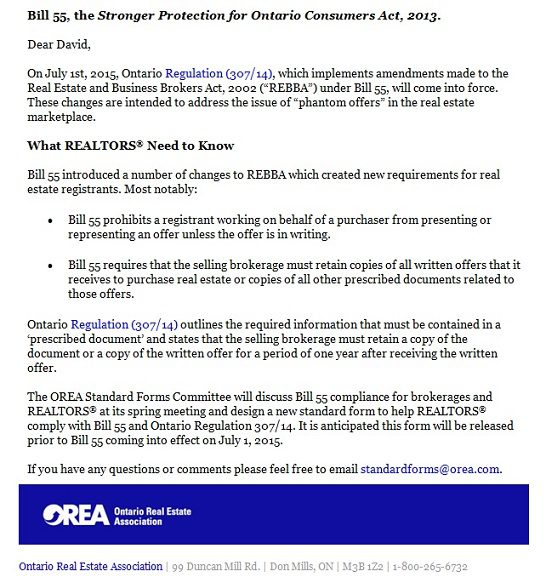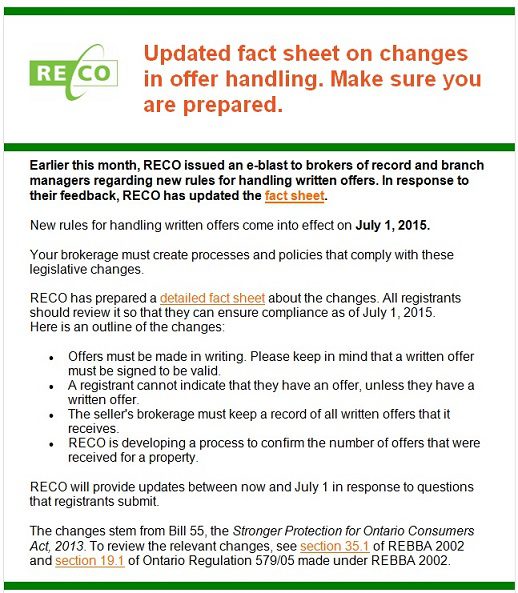Were they ever really a thing of the present to begin with?
Or are phantom offers as much of an illusion in practice as they are by their very definition? That’s ironic, isn’t it?
New legislation is coming into play on July 1st that intends to eliminate “phantom offers” from the world of organized real estate.
Let’s take a look at phantoms of all shapes and forms…

What do you think of when you hear the word “phantom?”
I ask this, because I’m willing to be that you don’t think, or visualize, a definition of the word in the traditional sense of a ghost, spirit, or illusion.
It’s one of those words that has many associations along with it.
Personally, I think of “Phantom of the Opera” first:

In 1991, my class took a field trip to see it.
I hated every minute of it…
If you’re a child of the 70’s and you collected comic books, you might associate a “phantom” with this:

I never read comics.
I collected them, since I was obsessive-compulsive and would have collected Faberge eggs if I could have found an old lady to trade them with, but I never actually read comics as they were intended.
If you’re a movie buff, you might recall this awful, straight-to-video movie starring Mulder from X-Files, and Christof from Truman Show:

Or if you had a thing for older British women when you were 18-years-old (it was just a phase…), then you might remember “Phantoms,” starring a 36-year-old Joanna Going in her prime!
Oh, and it also had a young Ben Affleck. Remember when he was this young:

If you believe that “Star Wars” was actually the fourth episode in the series, and not the first, then you’re also impressed with DOUBLE light-sabres!

And last but most certainly not least, if you’re a rich, white, American oil-magnate, you think “Phantom” refers to this $250,000 Rolls Royce.
And if the photo below is any indication, you’re also pathetic.
You can’t buy a car unless it has a half-naked woman on the hood:

Don’t worry, gents.
We can see the car from different angles…

In real estate, we hear the word “phantom” and we think of something called a “phantom offer.”
A phantom offer, as you might expect, is an offer that simply does not exist.
The presence of the offer is felt by many, and the impact of that offer can be substantial. But the offer itself is an illusion, and was never real.
A phantom offer is created intentionally, with the intention to mislead, and defraud.
A phantom offer does not only occur in multiple offer situations, as many believe. A phantom offer can occur when there are, say, three registered offers on a house, and the listing agent represents that there are four, but a phantom offer can also occur when there are zero registered offers on a house, and the listing agent represents that there is one, or perhaps more.
The impact of a phantom offer should be obvious: the more offers there are on a property, the more money that property will likely sell for.
In a competitive situation, if there are two actual offers, but the listing agent represents that there are three offers (ie. one is a “phantom offer”), then the two buyers with actual offers will submit a price that is predicated on TWO competing offers, not one.
You reach a point, eventually, where the number of offers doesn’t matter. If there are ten offers, or thirteen offers, it likely doesn’t affect the price you, as a buyer, are willing to submit.
But when there are two, one, or zero competing offers, that is where a phantom offer can change things drastically.
Now I’ll be naive and suggest that I don’t think this happens often.
I also simply can’t fathom how a listing agent could blatantly lie and say, “You are competing against another offer,” when in fact, you’re not.
But imagine a condo listed at $439,900, that has a hold-back on offers. On offer night, you have the only registered offer, and you’re ready to go in at the asking price – $439,900. Then the listing agent calls to tell you, “A second offer just got registered.” Now you likely have to go above $450,000 to get the property, and you might go higher. $455K, maybe?
In the event that the second offer is a “phantom offer,” which is a nice way of saying, “complete and utter bullshit shovelled by somebody who should have his or her real estate license taken away,” you’ll end up paying an extra $15,000 for no good reason.
And that is what “Bill 55: Stronger Protection for Ontario Consumers Act, 2013” is supposed to eliminate.
Take a look at this OREA bulletin:

Again, I want to stress that I do NOT believe phantom offers are common.
And if they are, they’re most likely associated with very shady Realtors and/or brokerages. Call me naive, but a top agent is not going to risk his or her career to get a few thousand dollars more for the seller.
There have been times in the past when I’ve been suspicious.
If I have any doubts, I’ll ask the listing agent to prove the existence of another offer, or two, three, or whatever the number is.
I’ll ask for a list of the buyer agents who have registered those offers. If the listing agent doesn’t provide it, I’ll call the manager, or broker of record.
The problem is, as I’ve explained before, there are a lot of very shady brokerages, and many brokers don’t care, or are never on site or involved in the day-to-day activities of the brokerage, and thus don’t have time to care.
“Buyer Beware” rings true in this situation, and if you’re looking to submit an offer on a property that is listed by a brokerage and/or agent that you don’t trust, then don’t offer.
Here’s the bulletin we received from RECO:

It’s sad that we need to explain, “A written offer must be signed to be valid.”
Tell me there aren’t agents out there who believe that a verbal offer, such as, “If the Leafs win the Stanley Cup, I’ll run naked in the streets,” constitutes a true, acceptable offer.
The part that concerns me is, “RECO is developing a process to confirm the number of offers that were received for a property.”
Oh, great, so they don’t have a plan in place yet, and they’re going to scramble to get this done for July 1st. Bravo.
The part that I do agree with, is “The selling brokerage must retain a copy of the written offer for a period of one year.” That means that a listing agent, guilty of creating a phantom offer, can’t claim, “I don’t have a copy of the offer, and I can’t remember who presented it.”
My colleagues hate the above rule, since, well to be honest – we’re all good agents, who are reputable, and play by the rules. It’s like all the kids have to stay inside at recess because the one bad kid threw a spitball at the blackboard.
So on the one hand, we’re placating the lowest form of Realtor.
But on the other hand, we’re taking steps to ensure the lowest form of Realtor can no longer cheat, or at least, can get caught a lot easier when he or she does something shady.
Once again, and at the risk of sounding like a broken record here, I really, truly do not believe that phantom offers are prevalent in the business.
But the issue is that even one example of a buyer who over-paid due to a phantom offer is too many.
If a buyer offered $1,100,000 for a house, listed at $999,000, because there was a competing “phantom offer,” then that buyer was duped for $100,000.
And if it could be proved that the listing agent was guilty of representing a phantom offer, what is the penalty? A $10,000 fine from RECO? Maybe?
How about that agent has to pay $100,000 to the buyers? How about that agent loses his or her license and can never sell real estate again?
The stakes are far too high for this to be taken lightly, even if there are only a couple recorded cases of this every year at RECO, and I’m quite pleased to see that steps are being taken to make brokerages more accountable.































IanC
at 8:12 am
Might be very rare, but I would suspect a shady broker is working for a shady brokerage.
So calling the brokerage when you see red flags may not be doing much.
Might be a huge hassle to have RECO track every OFFER, but what’s the alternative?
We just assume that selling realtors could be talking out of their a$$?
Or make it easier to ask for audits. Require deposits for offers (even $1) and you have a trail.
I hope they can figure something out.
Paully
at 8:26 am
It is sad that they have to try to legislate this, but you have to believe that the relatively large sums of money involved are very likely to motivate at least some people at the ethical margin to engage in this kind of behaviour. I still remember my very first sales manager talking to me about ethical selling. He said that “anyone can be honest and ethical when things are good. The true test of your ethical core is how you behave when your bank account is empty and you think nobody is looking.”
Of course, the person who benefits most from multiple offers is the vendor, not the agent. There is nothing mentioned above that would stop me, as a vendor, from hiring someone to “put in an offer on my place” on offer night. Yes, they would have to sign a potentially legally binding offer, but if they offered substantially less than asking, there is zero risk of the offer being accepted.
Seems to me that there is even a business opportunity there for someone bereft of ethics to sell “extra offers on offer night” for a fee.
Craigslist and Kijiji, here I come…
Pete
at 8:31 am
Without meaningful consequences, I doubt this will have much impact on any realtor shady enough to lie about an offer in the first place. But I wonder, with proof, could the buyer sue the realtor for fraud?
Mike
at 9:17 am
I priced a Rolls Royce Phantom last year; the half naked women is a costly option that requires a lot of maintenance and when I mentioned the depreciation she kicked me.
Kyle
at 9:36 am
The fact that the Ontario Government had to legislate Bill 55 to force organized real estate to do what is by and large a sensible low effort thing (which by the way would have greatly improved their image had they proactively chosen to take it upon themselves to do) is an epic, colossal, momentous fail on the part of RECO. It pretty much confirms the “C” in RECO stands for “Cronies”.
If the Government actually felt the need to step in, it means there was at minimum a very strong perception that this kind of activity occurs. Regardless of whether it happens frequently, infrequently or never at all is moot. How hard is it to buy a filing cabinet, throw offers into said filing cabinet after each multiple offer presentation? For the ethical brokers/agents that is the extent of the additional effort. For the unethical ones, there is one additional step – stop lying about how many offers you actually have.
Appraiser
at 4:02 pm
Just to clarify, RECO regulates the trade of real estate on behalf of the Ontario government. Real estate in Ontario is governed by provincial statute, the Real Estate and Business Brokers Act. In effect RECO is the nominee of the provincial government to oversee the terms and conditions of the the Act and to provide enforcement of some it’s provisions.
Therefore, it is entirely proper under the current statute and enforcement climate for the government to dictate by official decree certain regulations regarding the presentation of offers.
It must be remembered that if the Toronto market wasn’t so scorching ‘friggin hot, multiple offers would not be so prevalent. But it is. Unfortunately, there are far more losers than winners on offer night. The losers have become whiners, and so it appears that the squeaky wheel gets the legislation.
The bottom line is that the new rules will have very little effect, despite the bleatings of the nay-sayers and conspiracy theorists. Why, you may ask? Simple. The truth, which David has repeatedly elucidated, is that the vast majority of business is conducted above-board.
Joe Q.
at 10:36 am
It seems to me that crazy multiple-offer scenarios with dozens of interested buyers are not really the target category for the new regulations about documentation of offers. Rather, it is situations like the one described in the G&M article about this regulation, where a property sits on the market for some time, someone finally comes along and makes an offer, and suddenly finds that another competing offer has materialized out of the blue.
On that point, while the vast majority of business can be indeed be conducted above-board, participants may yet still leave feeling that they may have been had. Requiring a paper trail for offers will improve transparency and increase faith in the way the system operates, which IMO is worthwhile on its own.
Appraiser
at 1:49 pm
To your first point. Any experienced agent will tell you that they’ve dealt with buyers that will absolutely not compete and will withdraw from an offer presentation if another offer is registered. Any agent willing to pull a fast one in that situation is a complete and utter fool.
On your second point regarding transparency, I concur.
Kyle
at 5:20 pm
@ Joe Q.
IMO there isn’t anything wrong with the crazy multiple offer situations, they might be opaque but unlike phantom bids they’re not outright fraud.
Back in 2007 i went through the exact same scenario you describe. I had my agent put in a full asking price offer on a house whose offer date had come and gone. The listing agent (whom is actually pretty well known in the West end) of course told us the house was priced for multiples, but we didn’t see any need to improve. A few hours later she said they received another offer and asked us then if we wanted to improve. It smelled fishy to us so we decided to walk away. To no ones surprise it did not sell to the other mystery offer, and sat on the market for a couple more weeks. It did finally sell just slightly above asking, which IMO has all the hallmarks of phantom bid attempt number two, but this time successful. At the time, i was not interested in putting my agent in the difficult spot of asking her to prove the existence of the other offer. Since he more than likely would have to work with her again in the future. Though he would have if i had asked him to. If this ever happens to me again after these new rules go into place, i will simply call up the Broker of Record myself and ask for the evidence.
Joe Q.
at 2:34 pm
Kyle, my point is that your episode from 2007 is the type of occurrence that I think the drafters of this legislation had in mind. Wild multiple-offer situations, not so much.
This is why I feel it’s silly to connect this new rule to the “far more losers than winners on offer night” for multiple-offer situations, who “become whiners” and “get the legislation” as a result.
Marina
at 10:01 am
It’s astonishing that this is yet to be legislated. There should be an open system where any agent can see how many offers are registered and who registered the offers. If I had my way it would also show for how much each offer is, but that’s a separate conversation.
When an agent submits the offer, they scan it and submit it electronically. Then there is a record of everything. Simple.
Meh
at 10:48 am
Ok, so an agent lies and says there is an offer when there isn’t. What if the genuine offer walks?! Buyers loath being in competition. I’ve had plenty of buyers who would rather walk away from a property than be played against another purchaser. Granted, they’ll be walking away from a lot of properties in the current market and will eventually (probably) change their tune. But, as a strategy to get more money, phantom offers seem way too risky, not to mention all the ethical reasons.
I think buyers are paranoid and phantom offers likely aren’t that common. Buyers believe someone or something is thwarting them from getting their dream home (selling & buying agents, seller & competing buyers.) They take the process all too personally. They treat real estate like retail, which it is not. They have a sense of entitlement. And they feel powerless because they can’t just throw more money at the problem to solve it (because it’s the banks money – not because they don’t want to!)
Legislate or not – buyers are going to continue to see the process as unfair so long as we are in a seller’s market.
jeff316
at 10:07 pm
I think this is the most accurate post thus far. Phantom offers are just the release valve for buyers who do not like the current balance of the market. While I think it is good that the government stepped in with a relatively low-cost, low-burden requirement, government doing something doesn’t necessarily constitute recognition of a real problem. But smart politicians know that, most often, perception matters more than reality.
Joe Q.
at 2:40 pm
“Phantom offers are just the release valve for buyers who do not like the current balance of the market.”
Not sure I understand this… especially since the target situations seem to be ones in which there are no other “real” competing bids.
jeff316
at 11:23 pm
I’d be willing to bet that there have been more phantom offers in the minds of buyers than there ever have been real phantom offers from sketchy selling agents. They are a convenient excuse when additional buyers enter the fold. It is a perception issue on the buyer’s end. If an agent is so unethical that they are willing to fake an offer to get a higher price, is having to fill out a slip of paper really going to deter them?
Joel
at 11:04 am
I think that this is a very reasonable request. It’s not being enforced to say that realtors are shady, but to offer comfort and assurance to the individual purchasing the house. The stock and investment markets are regulated much more stringently than the housing market and the average person spends more money on a house than in the stock market, and generally with much more leverage/risk.
Meh
at 11:07 am
The housing market is riskier than the stock market? Please elaborate.
joel
at 6:12 pm
I was stating that most leverage or borrow money to enter the housing market and most don’t leverage or borrow to invest in stocks. Borrowing money to invest, in a home or stock creates more risk than doing either with your own funds.
Appraiser
at 7:05 pm
Risk to whom?
Meh
at 7:32 am
Alas … we are in total disagreement.
joel
at 8:13 pm
Not sure if the initial concept got lost here… The article is about adding regulations so that customers are not mislead into paying more by a professional that they should trust. My point was that financial professionals have more regulations and disclosure than a Real Estate agent, when the general consumer is investing more in their house than through their financial planner and with more leverage, which is riskier.
Joe Q.
at 10:12 am
Joel’s point seems like basic economics to me. It’s the shift in risk / reward balance when using leverage to make a purchase.
On the upside, you can use someone else’s money to buy a rapidly appreciating asset, which you can then sell for a much greater profit than you otherwise would have realised.
On the downside, you can borrow money to buy an asset that then rapidly depreciates, leaving you with debt that exceeds the value of the asset.
Leverage provides the potential for greater reward, at the cost of greater risk.
Cedric
at 10:19 am
To me it’s pretty clear that buying an asset outright is less risky than being leveraged to the eyeballs to buy it. Risk would be to their own person should they lose source of income for a prolonged period of time, perhaps forcing the sale of the asset in a negative equity position.
I agree that with such large sums of money, most of which is borrowed, this is no place for shady dealings in the marketplace.
Appraiser
at 11:21 am
So is it your position that If you buy something outright and is loses value, there was no risk?
True, there is still interest to be paid on the borrowed funds, however, not only is the nominal loss the same as if the money was borrowed, but there is the opportunity cost of spending the cash on said asset to consider, which mitigates against the interest costs.
Either way there is risk, and all things considered, I would argue that the risks are almost identical.
Cedric
at 1:45 pm
I agree that if two people had $1M and one spent it all on a house, and the other put 10% down and kept (or invested to mitigate interest costs) the remaining $900k, that the risks are generally the same.
But if one person had $1M and another only had 10% down, and they both bought that $1M house, I would argue there is less risk to the person who bought it outright. Not less risk related to the value of the house, but risk related to change in circumstance affecting one’s ability to carry the debt.
Granted these two individuals are not in the same situation, but going back to Joel’s original post, it was my impression that he was comparing a highly regulated marketplace (stock market) in which typically the investor purchases investments using their own money, to the loosely regulated real estate market where very large purchases are made using other people’s money, and hence the related leverage risk.
SMR
at 5:37 pm
If we used the Australian system where houses are auctioned, the whole process would be both much more transparent and reduce the needless overbidding (when you don’t know what you are bidding against). The system we have now is mired in problems.
And to make things even more ethical, what about a system where agents were either buying agents or selling agents, but not both? And they got paid based on the actual effort involved in their portion of the sale, not just based on the selling price. That would reduce agents trying to drive prices up…
Appraiser
at 7:14 pm
@ SMR: Auctions equal multiple offer situations – guaranteed!
Please define “effort involved in their portion of the sale.” And also please define the amount that all of the losing agents in a multiple offer situation should be paid for their “efforts.” If you said zero, that would be what it is now!
P.S. In the NHL, do players get paid for “effort” or for putting the puck in the net?
SMR
at 7:30 pm
Multiple offers are fine, but if you know what you are bidding against you won’t go way way over what you needed to to secure the property.
Re “effort”, I don’t think it necessarily takes any more effort to sell a 1.2 M house than a $700k house (and sometimes the inverse is true too), so I don’t agree with the way the commission structure is set up because both the buying and selling agent benefit when the price is inflated. I’ve been in sales my whole career, so know there are different, equitable models that can work.
Appraiser
at 8:35 am
@ SMR:
There are multiple commission structures available, including not using a Realtor at all. My guess is that you have limited or zero experience with real estate. What I can assure you though, is that empty theorists with simple solutions to everything abound.
P.S. Real estate auctions are perfectly legal in Canada. Just not very popular.
SMR
at 5:05 pm
@ Appraiser
Attacking people personally doesn’t add any value to this interesting discussion. Personal attacks are typically the sign of a defensive person. And defensive people are usually trying to protect or hide something that they feel is at risk (like, perhaps the current system).
And you are dead wrong about me: I’ve bought and sold 4 properties in Toronto, which I’d say is beyond limited or zero experience.
jeff316
at 10:15 pm
He’s not attacking you SMR, but he is pointing out that your points aren’t making a lot of sense. That being said, he’s doing it in a jerky way which gives you an out to change the subject.
In this current model, it is up to the buyer to set a value they feel comfy with and stick to it. Whether or not you big x or x+1 above the next offer is not relevant as long as you were comfortable with your valuation.
In the Australian model takes that personal value judgment and makes it comparative to the other bids, highly increasing the likelihood that you will pay more than you originally wanted.
Auctions exist to get the most money for the seller, not to make the buyer feel better inside.
Joe Q.
at 2:56 pm
“In this current model, it is up to the buyer to set a value they feel comfy with and stick to it.”
I would argue that the same holds in the Australian model.
“In the Australian model takes that personal value judgment and makes it comparative to the other bids”
… and I would argue that the current model as practiced here often does the same, once multiple parties start getting sent back to improve their offers.
I can understand and appreciate that having an Australian-type live-auction format might make people more emotional and encourage the crossing of previously set boundaries. I just think that this emotion is not absent from our current model either.
Kyle
at 5:32 pm
@SMR
How many of those 4 properties that you’ve bought and sold , did you sell through an auction?
SMR
at 7:02 pm
@Kyle. None….and that is exactly why I am making my point. Our process is totally opaque….in that you have no idea how much you “overbid” to get the property. At least in an auction, you know exactly what people are bidding, and you get to decide if you want to keep going higher. I don’t think our current process is any less emotional than an auction. Just like gambling…know your limits going in.
ps. What’s with all the useless, inflammatory posts on this most useful blog? Stop with the personal attacks!
Kyle
at 8:02 pm
It’s not a personal attack. I think it’s a fair question to someone who believes that auctions are a better way to transact. Given that the option of using an auction house is currently available to you seems rather odd that you would not have taken advantage of it yourself.
jeff316
at 11:16 pm
Re: picking a valuation and sticking to it – “I would argue that the same holds in the Australian model.”
Except that in the Australian model that maximum valuation is made directly against the valuations of others in a public and fluid auction system designed to make you pay as much as possible.
“I can understand and appreciate that having an Australian-type live-auction format might make people more emotional and encourage the crossing of previously set boundaries. I just think that this emotion is not absent from our current model either.”
Emotion is not absent from any economic transaction. This whole argument in favour of auctions is about emotion, as its proponents are effectively admitting that they are willing to on average pay more for additional peace of mind about the outcome.
It’s certainly not surprising that people don’t like the current system. Not because of transparency or bidding wars, but because the current system requires a lot of buyers – a lot of research, self-assessment, strategery, confidence in one’s decisions and most importantly maturity to deal with the outcome once the process is over.
But what they get in return is a more independent process where they are bidding what they think the value is, based on their financials, their judgment, with minimal outside influence. The current system is much more empowering and a lot safer.
I get why people like the theory of public real estate auctions. But it’s bad for the market, but for consumers and bad public policy.
mortgageJAKE
at 4:32 pm
IF we used the australian system we’d pay 7% more on average BECAUSE Of the transparency.
What’s worse:
A house in Leslieville packed at 7pm with 10 families/couples making bids in front of each other, outbidding each other in an auction-style format.
OR
A house in Leslieville whose street is packed at 7pm lined with agent’s BMWs waiting to present blind offers (blind to the others around)?
I would say that the OZ system isn’t without it’s fault. The system we have now at least tells you:
Look. You have one shot. Or, you may have a second if your first shot is good. OR, no, just one shot. At least you know what you’re willing to pay. In the OZ system, you might say you will pay x, but that x will suddenly not be enough when you are bidding against the hotshot across from you and now emotions get the best of you.
(ever been to an auction?)
(that 7% number was a number floated by the NY times, so I didn’t pull it out of thin air, but you can consider it junk because I can’t find the link to it yet)
jeff316
at 10:11 pm
^^^ This. Exactly. I wouldn’t have posted my post below had I seen this one. It’s nice to have someone else recognize this.
jeff316
at 10:10 pm
The Australian system guarantees that each and every home will get sold for the highest price in an auction. It contributed to one of the most overheated markets in the world.
Calling for open auctions is simply an emotional salve for buyers. It will do nothing but drive prices higher, and disadvantage skilled and strategic agents and their buyers in the name of making people feel a little less emotional about it all.
The points about agent pricing are irrelevant and show a lack of knowledge about the different pricing models for agents.
condodweller
at 8:28 pm
I have never seen a definition for ethics more succinctly summed up than: “Ethics is when you do the right thing when no one is looking.”
Geoff
at 8:44 pm
Affleck was ‘da bomb in phantoms, yo!
Corinne
at 11:23 am
We dealt with this in Manitoba when I was working in real estate there and the listing agent had to use a tracking sheet with the presentation of all multiple offers. It recorded the date of the offer, the brokerage name, agent name and time and date it was presented to the seller. The seller had to sign off on each entry on the tracking sheet and it was stored with the listing brokerage along with copies of every offer. The listing agent was not allowed to reduce their commission in a multiple offer situation either.
Riverdalian
at 2:50 pm
I recently put in an offer on a house in Riverdale and am convinced the listing agent used a phantom offer. The agent claimed there were 2 other offers and one was from an individual in Dubai working with the listing agent. The offer was verbal only. In the end the mystery Dubai purchaser dropped out. Perhaps with the drop in the price of oil, the oil sheikhs can’t afford Riverdale prices. I’m considering filing a RECO complaint.